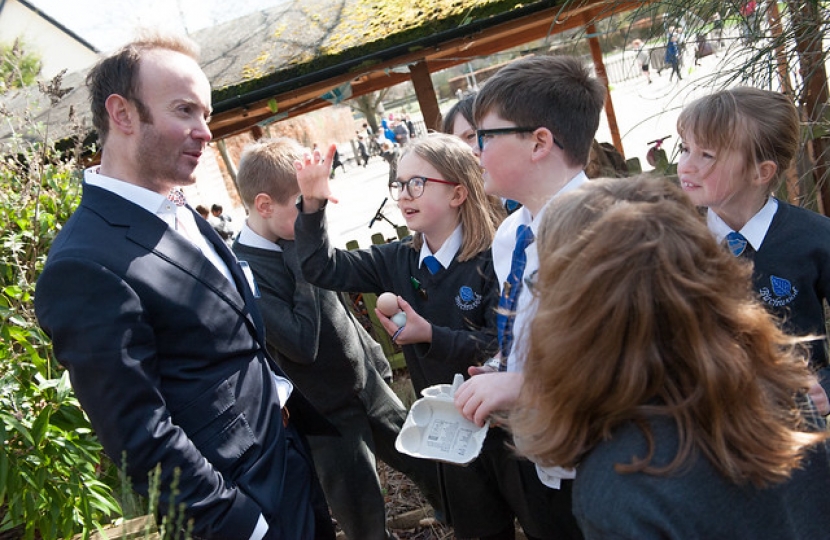
Earlier this year, at our full council meeting on 21 March, Suffolk County Council declared a Climate Emergency and only a matter of weeks later, MPs in Westminster approved a motion to declare an Environment and Climate Emergency on a national scale. 2019 has seen a newfound sense of urgency around this vital issue, and that is heartening, but we need to deliver more than just words.
So, what does declaring a Climate Emergency mean?
In a nutshell, we have set Suffolk the aspiration of being carbon-neutral by 2030.
Reducing the amount of carbon dioxide (CO2) that we all put into the atmosphere is just one factor, but a large one. Yes, we can “offset” this CO2 output, but we must focus on ways to stop exhausting and, ultimately, using limited natural resources like coal, oil, and gas in the first place.
Supporting local organisations to be carbon-neutral
I’m delighted that Suffolk County Council’s leader, Cllr Matthew Hicks, recently highlighted the Council’s environment work as one of his priorities for the coming year and I’m excited by the challenges we are setting ourselves. Although the Council should be proud of our positive track record on reducing energy consumption, carbon emissions and waste, I fully appreciate that we all have a responsibility to do more and to do it now.
The council is already involved in long-running projects to help local businesses and organisations achieve these ambitions. I’d encourage you to get in touch with us about the Suffolk Carbon Charter and Business Energy Efficiency (BEE) Anglia. BEE Anglia has supported over 900 small businesses with free advice and grants to reduce their energy costs and carbon emissions. The Charter helps you work towards an award to show how you are reducing your business’s carbon emissions.
Suffolk County Council has taken a lead on this, currently working towards all our properties becoming carbon-neutral and working with schools to do the same. 85 of our properties already have solar panels installed and last year our Constantine House building in Ipswich installed battery storage, which means it can store its own energy generated from solar panels.
Supporting people and electric vehicles
In the last year, the council rolled out the Solar Together Suffolk scheme, which offered homeowners the chance to install solar panels at a discounted price. The discount worked out at about 20% less than the market value and we had over 700 installations across the county.
It was recently claimed that a quarter of all councils in England and Wales are holding back on investing in electric vehicle (EV) charging networks, but this is far from the case in Suffolk - in fact we are leading the way with a UK-first.
We have recently launched Plug In Suffolk, which aims to install 100 open charging points across the county for EVs. The project is being rolled out in association with locally based EO Charging and renewable energy provider, Bulb. You just need to tap a debit/credit card, there is no registration, membership or app required.
This will vastly improve the county’s EV infrastructure, meaning more incentives for residents to ‘go electric’, and boost our economy by making Suffolk an EV-friendly destination.
Creating the Greenest County Awards
I’m genuinely excited that our Greenest County Awards are back in 2019. Nominations have just closed and we’ve had over 120 entries, which is a fantastic reflection of the dedication of Suffolk’s communities and their passion to look after our environment.
The awards ceremony will be held on 17 July. It’s a fantastic event to recognise the efforts being made in Suffolk, but also by bringing together such a range of people, creative discussions and new networks are always formed.
What’s next?
Speaking of bringing people together, we are launching a Policy Development Panel to focus on our environmental ambitions. This panel will be made up of councillors from all parties, to share the best ideas and put them into practice as quickly and efficiently as possible.
I am also working on refreshing Suffolk’s ambition to Create the Greenest County and will be launching a new Greenest County Strategy later this summer. This will outline the action we can take with immediate effect.
When I’ve met with young campaigners on the Ipswich Town Hall steps, when I’ve visited schools, when I open my inbox, I see the passion for our environment and the desire for more action.
We see daily reports of how our environment is being impacted, and the message is that we must act now. I want things to happen, not just talk about them.


